Contents
Plum Renklod – the famous family of fruit trees. Subspecies varieties have excellent taste. Their versatility makes the plant suitable for growing in a variety of climates.
History of variety breeding
The history of the plum begins in 16th century France. It was bred on the basis of the Verdicchio variety. The name Renklod was given in honor of the daughter of Louis XII – Queen Claude.
Variety description
Renklod plum is widespread in many countries, regions with different climates:
- Our Country;
- Ukraine;
- Belarus;
- France;
- Italy;
- Germany, others.
The variety includes a large number of varieties. They are united by common features, features:
- The average height of trees is 4-6 m.
- Branches of a red-brown hue become gray after a while.
- Leaves with veins, light hairiness.
- Crown plum spherical shape.
- Round fruits grow up to 4-5 cm. Each subspecies has a different color – from light green to dark purple. The taste of dessert plums is sweet.
Ranclaud Altana
The history of the variety begins in the Czech Republic in the 19th century. It appeared due to an independent mutation from the seeds of Renclod the Green. The main characteristics of the subspecies:
- Plum height – 6,5 m. The crown is spherical.
- Large fruits. The weight of one is up to 40-45 g. The plum is light green in color, the flesh is amber. The fruit is juicy and sweet.
- Can grow on any soil.
- The variety is growing rapidly.
- Drought and frost resistant.
- Altana is a self-fertile variety. To improve fruiting, Mirabelle Nancy, Victoria, Renklod Green, Hungarian Home are planted nearby.
- First fruiting after 3 years. One plum brings about 30 kg of fruit. An adult tree increases this figure to 80 kg.
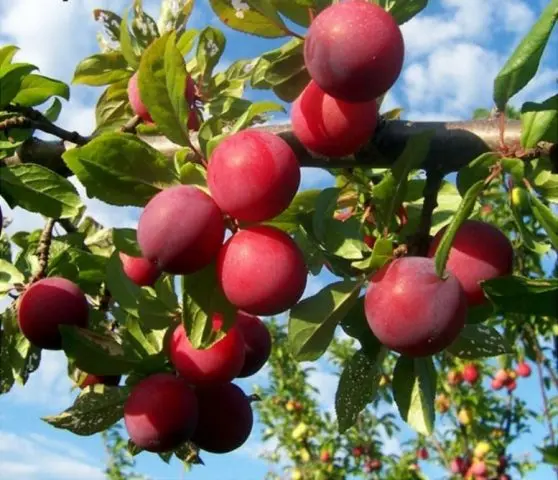
White
The dull white color of the fruit is a distinctive feature of the White plum variety. The exotic shade does not affect the taste of the fruit. They are sweet and juicy. The weight of one plum is 40-45 g. It bears fruit in the third year of life. The tree reaches 4-4,5 m in height. The variety is resistant to arid climate, frost.
Most often, the fruits are consumed fresh. Canned blanks from white plums have an unaesthetic appearance.
Beauvais
The species prefers warm climates. Most often found in the Krasnodar Territory, in the North Caucasus. The Bove variety has characteristic features that distinguish it from other subspecies:
- Plum – medium in height. Branches grow rapidly, chaotically. The crown is not dense.
- Self-fertile variety with large, sweet fruits. Beauvais plums are yellow-green in color, with a purple spot on the side.
- Fruit ripening occurs by September.
- The variety gives a bountiful harvest – from 50 to 100 kg of fruit in one season.
Beauvais plums are well transported. They keep their appearance for up to two weeks.
Enikeeva
The Enikeeva variety is an excellent option for a small area. Fruit ripening begins in mid-August. Fruits in medium-sized fruits of lilac color. Plum weight – up to 25 g. One tree accounts for up to 10-15 kg of yield.
The subspecies is resistant to drought, frost, pests. It is self-fertile and does not require pollinators.
Renklod Yellow
Greenclod Yellow is characterized by rapid growth. Plum reaches 6 m in height. Ripening occurs by the end of summer – the beginning of autumn. The fruits are small, rounded, slightly flattened on the sides. The flesh of the fruit is green with yellow. The taste of plums is sweet. The fruits can be transported over long distances. They do not deform, retain taste.
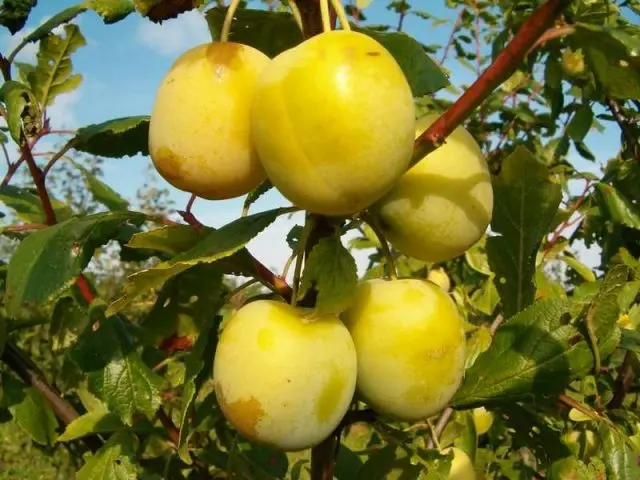
Greengage Green
Variety Green is the ancestor of the remaining subspecies of the Renklod group. Plum is resistant to drought, frost. It can be grown in the southern, northern regions. It is undemanding to the composition of the soil. Excessive moisture can adversely affect the health of the tree. Moderate watering should be carried out.
Plum Renklod Green grows up to 7 m. Its crown is sprawling, wide. She prefers space, abundant lighting.
The first fruiting occurs after 5 years. The first fruits ripen in August. The yield gradually increases from 30 to 50 kg.
The fruits are small – up to 20 g. Yellow-green fruits are very juicy, sweet. The flesh appears translucent.
The variety is resistant to diseases, harmful insects. Preventive measures exclude the possibility of destroying the plum through their fault.
Renklod Karbysheva
The history of the subspecies begins in 1950 in Ukraine. The variety is fast growing. To form a crown, regular pruning of branches is necessary.
Plum Karbysheva prefers warmth. It is severely damaged at low temperatures. The fruits of the first harvest weigh up to 50 g. Then they gradually decrease to 35 g. Dark purple fruits with amber pulp are considered dessert fruits. They are highly appreciated by experienced gardeners.
The variety needs additional pollinators among other Renklod subspecies:
- Early;
- Green.
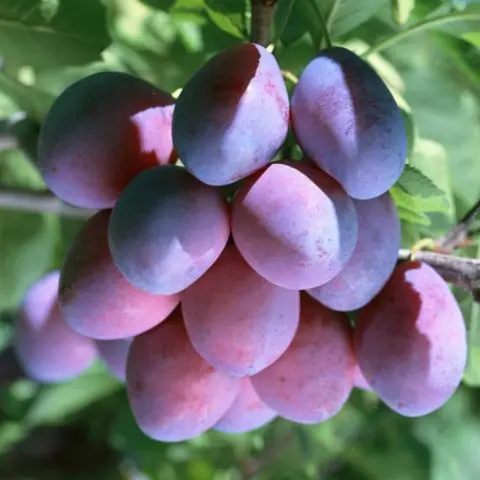
Renklod Kolkhozny
The Kolkhozny variety was brought out in the 19th century by Michurin I.V. It has features that distinguish it from other varieties:
- Plum withstands low temperatures. It can be cultivated in the southern, northern regions.
- The tree reaches 3 m in height. The crown is spherical, slightly flattened.
- Fruit ripens in mid-August. Productivity is annual, plentiful. Up to 40 kg of fruits are harvested from one plum.
- Yellow-green fruits weigh up to 20 g. Sweet and sour pulp is juicy, sweet.
- The subspecies is not disease resistant. It is recommended to carefully, regularly carry out preventive measures.
To improve the quality of fruits, increase productivity, pollinating varieties are planted nearby:
- Red Early;
- Renklod Thorn;
- Hungarian Pulkovo.
Red
Variety Early ripening Red – medium-sized plum. Its crown is wide, oval in shape. Blooms in mid-May. The end of August is the period of fruiting. Dark red plums are elongated, weighing up to 15 g. The first harvest is after 4 years.
The variety is partially self-fertile. He needs pollinators:
- Renklod Kolkhozny;
- The Golden Fleece;
- Hungarian Pulkovo.
Adult shoots are more resistant to frost.
Kuibyshevsky
In the 50s of the last century, the Kuibyshevsky variety was bred specifically for the northern regions. Plum frost-resistant. It reaches 6 m in height. The crown of the subspecies is spreading, dense. Round fruits of a light green shade with spots. The weight of one is 25 g. Harvested in August. A young tree brings 6-8 kg, an adult – 20-30 kg.
Important! Ripe plums hang on the tree for up to seven days. They must be cleaned in a timely manner to avoid damage.
Kursakova
The fruits of the Kursakova variety are red with a purple tint. They are very soft, juicy and sweet. The plum is barren. She needs additional pollinators. They may become other subspecies of Renklod. With good care, careful shelter for the winter, the plant survives severe frosts without damage.
Leah
The Leah variety prefers warm climates. The plant is disease resistant. First harvest in 3 years. Yellow fruits are not large. One plum weighs up to 12 g. Fruits are harvested at the end of August. The Liya variety is stored for a long time – up to 25 days.
Renklod Michurinsky
Variety Michurinsky is quite young. It was brought out at the beginning of the 21st century. The trunk is low with a spherical crown. Dark purple fruits are harvested in September. The weight of one fruit is 25 g. Plum gives 20-25 kg of yield.
The variety is characterized by high frost resistance. It can be transported over long distances without damage to drains. The self-fertile subspecies, in the presence of additional pollinators, will give a more abundant harvest.
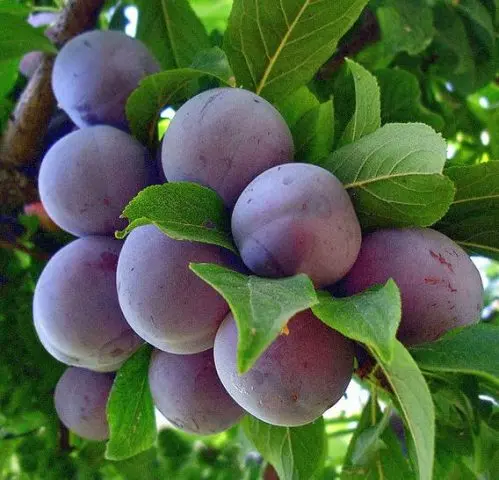
Opal
Variety Opal is characterized by high precocity, dessert taste of plums. A tree with a round crown grows up to 3 m. It is easy to form with pruning. After 3-4 years, the first crop is harvested.
Blooms in mid-May. The variety is not completely self-fertile. It needs pollinators for a bountiful harvest. The fruits are round, small, dark purple with a yellow-green spot on the side. Ripens in mid-summer. One plum in a good year gives up to 20 kg of fruit.
Presidential
Renklod Presidential grows up to 4 m. The crown resembles an inverted fan. Plums ripen in autumn. The weight of one is 55-60 g. Purple fruits with a yellow core. The taste is sweet, with sourness. The harvest of the subspecies is plentiful. Over the years, its volume increases. It is resistant to low temperatures, but is subject to many diseases and pests.
Renklod Early
The history of the Early variety begins in Ukraine in the second half of the 20th century. An important feature is that fruiting occurs earlier than others. In July, the first ripe fruits are harvested.
Plum is resistant to frost, tolerates dry periods. It grows up to 6 m. Its crown is spreading. Shoots are growing fast. They need regular pruning.
The yield of the variety is medium. The fruits of young plantings are large. The weight of one plum is up to 50 g. Round fruits are yellow-green in color. The side seam is visible. One half of the plum is larger than the other.
For a bountiful harvest, additional pollinators are needed:
- Hungarian Donetsk Early;
- Renklod Karbysheva.
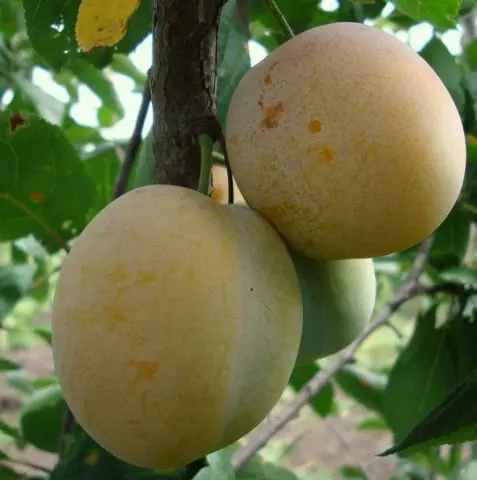
Reform
Variety Reform – heat-loving plum. She needs careful care, fertile soil, an abundance of light, protection from wind, drafts. Height – up to 6 m. The crown is rare, the branches grow randomly. The yield is not high – 8-10 kg. The fruits ripen in August-September. Round fruits of a yellow-green hue. One plum weighs – 20-25 g.
Renklod Pink
Variety Pink gives abundant fruiting, resistant to severe frosts. The first harvest brings in 3-4 years. Fruits of a pink shade with a purple tint. One plum weighs 25 g. The flesh is yellow with a green tint. The taste is sweet. The fruits ripen at the end of August. Fruits are stored up to 20 days.
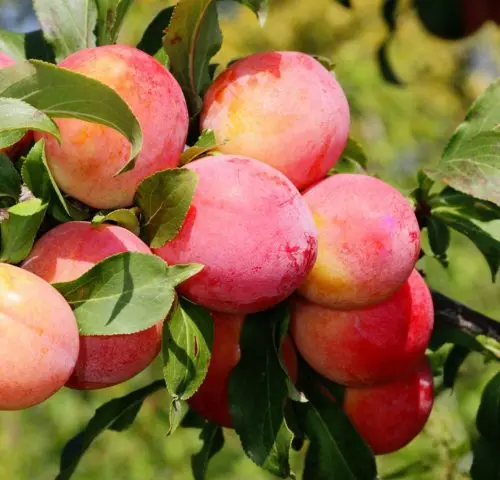
Renklod Blue
Variety Blue is resistant to frost. A characteristic feature is high immunity to diseases, harm to insects.
Plum bears fruit in 3 years. The weight of one fruit is 35 g. They grow close to each other. Oval dark blue plums. The taste is sweet, with a slight sourness.
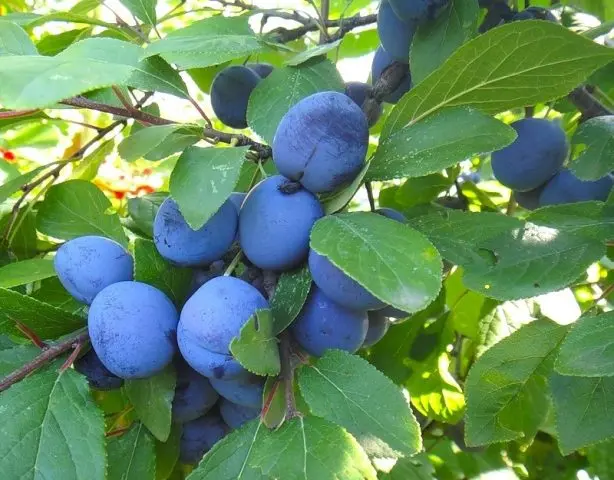
Renklod Soviet
Renklod Sovietsky is a popular plum variety. Its many advantages make it more in demand than other horticultural crops:
- Fast-growing. First harvest in 3 years. Fruiting is regular. A young tree bears up to 15 kg of fruit. More adults – up to 40 kg.
- High resistance to frost. Withstands extremely low temperatures.
- Plum height – 3 m. The crown is rare. This improves the access of light.
- The fruits are spherical. Color – blue. The weight of one plum is up to 40 g. The fruit is very sweet, with a slight note of sourness.
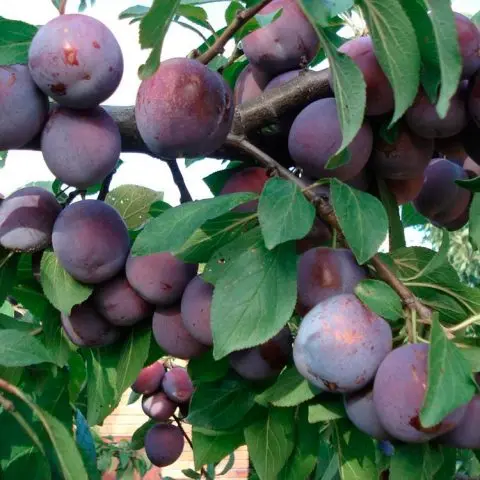
Renklod Tambovsky
The variety is widely distributed in Central Our Country. A low plum has a spreading wide crown. The subspecies tolerates cold well. The fruits are small. The weight of one is up to 20 g. The shape is elongated, the color is purple. Golden flesh is sweet and sour.
Three years later, the first crop is harvested. Plums are fully ripe by September. One tree gives 15-25 kg of plums. The variety is self-fertile. Pollinators are needed for abundant fruiting.
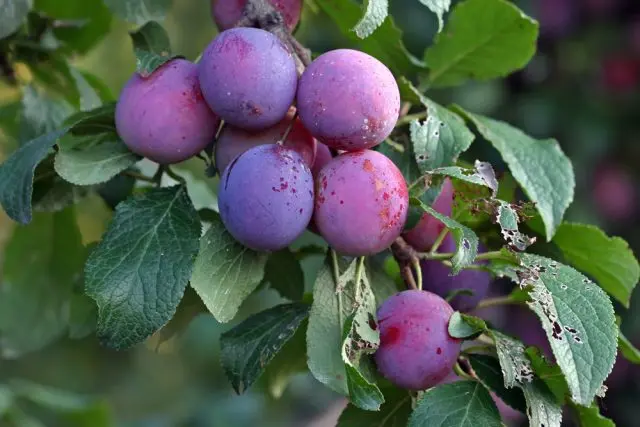
Tenkovsky (Tatar)
Variety Tenkovsky has an average level of resistance to frost, pests, diseases, drought. Grows up to 3 m in height. The crown is thick. Fruiting occurs 3 years after planting.
Shcherbinsky
Variety Renklod Shcherbinsky is self-fertile. Brings an annual harvest of dark blue sweet fruits. From one tree you can collect up to 20 kg of fruit.
Characteristics of a variety
Distinctive features of the Renklod variety are the basis for organizing plant care.
Drought resistance, frost resistance
The variety is resistant to hot climates, temperature extremes. With additional warming, it can winter in the northern regions of Our Country.
Renklod plum pollinators
The flowering period of the Renklod variety is different for each subspecies. The average flowering period is May-June. For a bountiful harvest, some varieties do not require additional pollination. Self-fertile varieties include:
- Gazebo;
- RenClaude de Beauvais;
- Enikeeva, others.
Many subspecies require pollination to increase fruit production. Renklod Kolkhozny prefers nearby Krasnaya Skorospelka, Renklod Ternovy, Hungarian Pulkovo. The Soviet subspecies is perfectly pollinated by similar Renklods. To improve fruiting, Mirabelle Nancy, Victoria, Renklod Zeleny, Hungarian Domashnaya are located next to the Altana variety.
yield, fruiting
Renklod is popular with gardeners for its bountiful annual harvests. The number of plums harvested from a tree increases with the age of the plant. Renklod fruits are sweet, sometimes there is sourness. The size depends on the subspecies, correct care. Fruiting occurs in the second half of summer. Late varieties give a harvest in early autumn.
Scope of berries
Dessert fruits of the variety are perfect for cooking jams, jams, compotes. Fresh plums are a wonderful summer dessert.
Disease and pest resistance
Trees of the Renklod variety are highly resistant to the influence of insect pests and the manifestation of diseases. Regular preventive measures minimize the risk of such occurrences.
Advantages and disadvantages of the variety
The Renklod variety has undeniable advantages over other horticultural crops:
- Abundant annual harvest.
- Uncomplicated care.
- Delicious large fruits.
- Disease resistance.
- Ability to tolerate low temperatures, drought.
Plum does not like drafts, winds. The site must be well protected.
Features of landing
Planting a Renklod variety is an important component of proper tree care.
Recommended dates
It is recommended to plant seedlings of Renklod subspecies in the spring.
Choosing the right place
When choosing a suitable place on the garden plot, it is worth considering a number of factors:
- The soil should be loose and fertile.
- The tree prefers an abundance of sun.
- High groundwater levels should be avoided.
- The place should be located on a hill.
What crops can and cannot be planted nearby
The Renklod variety needs pollinating trees for a bountiful harvest. Similar subspecies cope with this task perfectly. They are recommended to be planted next to each other. It is not advised to place plantings of cherry plums, Chinese plums, and blackthorns nearby.
Selection and preparation of planting material
Planting material must be prepared in advance. The standard set of garden tools includes:
- shovel;
- rakes for loosening;
- stakes, rope for fixing the seedling;
- fertilizers;
- water.
Landing algorithm
The procedure for planting cuttings Renklod begins in the fall. The algorithm is very simple:
- Holes for seedlings are prepared in the fall. Depth not less than 60 cm. Diameter – more than 70 cm.
- Soil preparation. The soil from the pit is mixed with humus, potassium.
- Two pegs are lowered into the hole.
- A cutting is placed nearby. Its roots should be at a distance of 5 cm from the bottom of the pit. Sprinkle with earth, tamp.
- A young tree is tied with a soft rope to stakes.
- Water each planting generously.
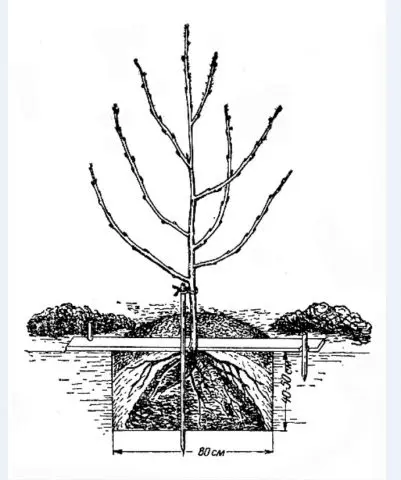
Plum Aftercare
Plum Renklod – unpretentious plant. Caring for him will not require large time, material costs:
- Watering. Renklod does not like excessive moisture. It is recommended to water regularly, but moderately.
- Fertilizer. Top dressing of the plant begins 3 years after planting. Before flowering, saltpeter, potassium salt, mineral fertilizers are poured into the soil next to the tree. During flowering, the plum is fed with urea. After flowering, a solution of mullein, superphosphate is added to the tree.
- Pruning. The procedure is performed before the appearance of the first foliage and in early June.
- Preparation for winter. Young seedlings are covered with spruce branches, needles. It is enough to whiten mature trees, cover the roots with sawdust.
- disease prevention, pests.
Diseases and pests, methods of control and prevention
Disease / wrecker | Control methods / Prevention |
Plum moth | As methods of control, spraying with a solution of “Karbofos” is used, treated with coniferous concentrate |
Plum aphid | Every April, the tops of the tree are washed with soapy water. |
Plum moth | To destroy this pest use the drug “Chlorophos” |
Conclusion
Renklod plum is a famous fruit tree. The variety includes a wide variety of subspecies. Each variety is unique due to its distinctive features. The universal variety is very popular among gardeners from different regions.









